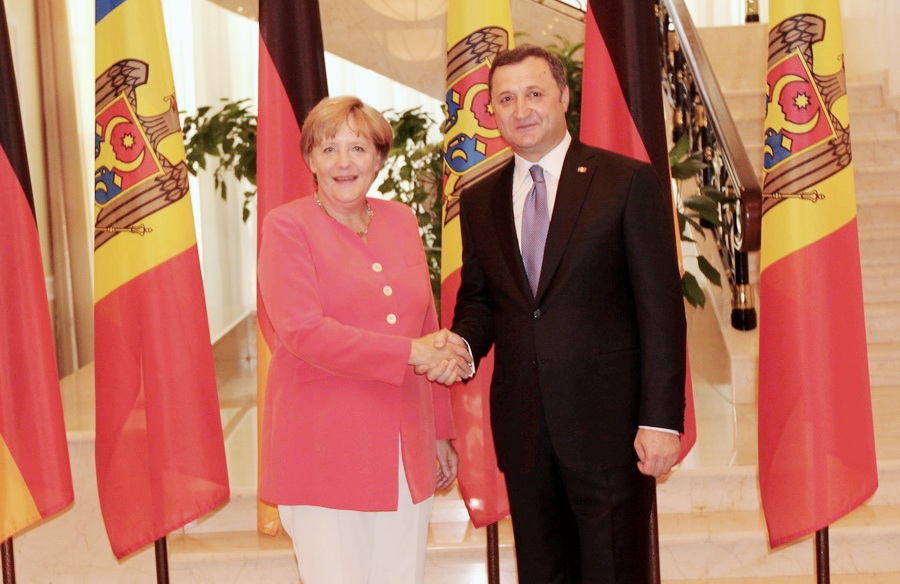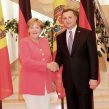
Angela Merkel Opens a European Perspective for Moldova
Publication: Eurasia Daily Monitor Volume: 9 Issue: 160
By:

Visiting Moldova on August 22 (see accompanying article), German Chancellor Angela Merkel declared twice unambiguously that Moldova does have a “European perspective”—albeit in a “step-by-step process”; and “we shall accompany you along this path” (www.bundeskanzlerin.de, August 22, 23). Potentially, this opens the possibility of Moldova’s recognition as an EU candidate country down the road, beholden to the standard conditionalities. Such a message constitutes a major political incentive for Moldova (as it would for any would-be candidate country) to implement the EU reform criteria. Filat and Foreign Affairs Minister Iurie Leanca have assessed this message as a breakthrough for Moldova (RFE/RL, August 29; Moldpres, August 30). The opening of a “European perspective” can strongly motivate reform and anti-corruption efforts. That perspective helps overcome the resistance of special interest groups that stand to lose from judicial, law enforcement, and market economy reforms.
If consistent, the “European perspective” message can sustain public support for the twin agendas of European integration and reforms. That support is currently faltering among Moldova’s populace. Although European officials cite Moldova as the EU Eastern Partnership’s one potential “success story” (with Chisinau’s elite opinion embracing that assessment), Moldova’s ordinary citizens hardly experience any palpable gains from that evaluation at this stage. Moldovan opinion surveys in 2011 and 2012 show support for European integration declining toward 50 percent, with support for the Russia-led Eurasian Customs Union rising toward that same level (Unimedia, Infotag, July 24; Jurnal de Chisinau, August 6). Such dramatic shifts stem from the West’s multiple crises, which appear to contrast with Russia’s resilience and recovery. Moldova’s Communist Party had championed the European orientation while in power, but has recently shifted with the perceived winds toward a pro-Eurasia orientation, and leads the party’s mass base in that direction. Russia’s mass media, dominant in Moldova, propagates stories framed with rhetoric on Eurasia versus Europe, usually without an offsetting message from Europe itself. Merkel’s visit has now brought an offsetting message and set a follow-up process in motion.
Meanwhile, Moldova remains vulnerable to Russian economic leverage, the impact of which extends to Moldova’s domestic politics. In the immediate wake of Merkel’s visit, Filat is scheduled to visit Russia under those constraining circumstances. Receiving him will be Russian Prime Minister Dmitry Medvedev, co-signatory with Merkel of the Meseberg Memorandum on Moldova in 2010 while Medvedev was president of Russia (see accompanying article). Since then, however, the Kremlin has launched its Eurasian Union project; and Medvedev will probably hold out this alternative for Moldova during Filat’s impending visit. Russian President Vladimir Putin is said to consider joining that conversation, apparently to pitch the Eurasia option. Filat will have to fend it off diplomatically in his response.
In that context, Merkel’s European message in Chisinau carries a double address: directly to Moldova and indirectly to Russia. It lays down a marker for Europe in Moldova, clearly delimiting the country from Russia’s Eurasia project, and offering a European choice to Transnistria as part of Moldova.
The Moldovan government has a one-year window of opportunity to sign the EU association agreement, deep and comprehensive free trade agreement, and a liberalized travel-visa agreement with the EU, during the second half of 2013. Those agreements, once signed, could sharply reduce the current levels of Moldova’s dependence on Russia for export markets and migrant labor remittances. Moldova’s citizens would then experience palpable gains from trade with and travel to European Union countries. Chisinau would gain more political elbow room vis-à-vis Moscow, while the aberrant pro-Eurasia trend would recede in the country.
Late 2013 is a political deadline with triple significance. The EU will at that point hold its Eastern Partnership balance-sheet summit, potentially highlighting Moldova and confirming a European perspective (see above) for the country. At that same time Germany will hold parliamentary elections, which might change the German government’s composition to Merkel’s detriment (her Christian-Democrats face an uphill re-election campaign, their right-of-center Free-Democrat allies at the Foreign Ministry will almost certainly lose their place in the coalition, while the left-leaning and Russia-friendly Social-Democrats seem likely to re-enter a coalition government). And at that same point, Moldova will be embarking on its own parliamentary election campaign.
Filat’s party could win those elections on the basis of leading the country’s European integration process. Liberalized travel to the EU could become a clinching argument to Moldova’s voters, faster than the effects of free-trade agreements. The government must work against the clock for the EU association and related agreements to be signed, sealed and delivered within that time frame. Often in the EU, and always in Europe’s East, a project can only succeed if adopted and championed by at least one powerful member country. Filat’s government has apparently succeeded in motivating such a champion in Berlin.




